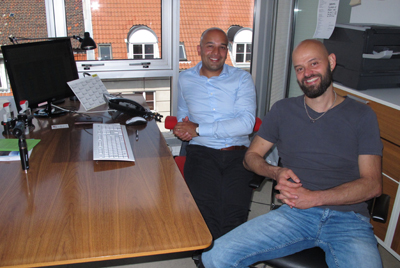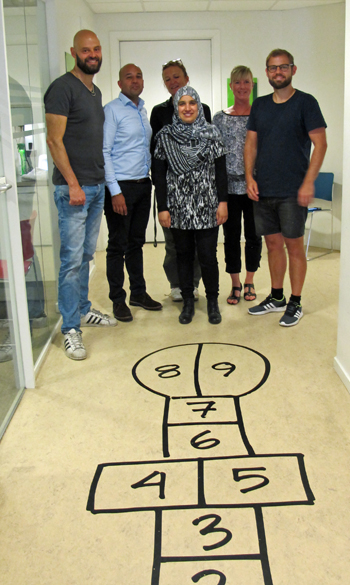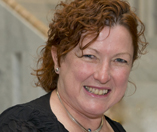Karen Flegg - A very Danish practice experience.
 Photo: Danish colleagues, Gobind Kalsi and Kristian Müller in Gobind's "paper free" office
Photo: Danish colleagues, Gobind Kalsi and Kristian Müller in Gobind's "paper free" office
The recent WONCA Europe conference provided an opportunity for attendees to undertake a visit to the practice of Danish colleagues. I was welcomed by Dr Gobind Kalsi and Dr Kristian Müller at their practice in Vesterbro, Copenhagen. Vesterbro is a suburban area of people who are mostly well established in large houses, or young and trendy enjoying the proximity to the city centre.
The practice is on the fifth floor of a building that conveniently houses what I consider to be a community health centre providing free services such as a weight loss centre for obese children and a centre for patients with chronic diseases such as diabetes, COPD, and heart disease which provides access to patient education courses (for example for diabetes and quit smoking).
The first thing I notice in the sleek, custom designed clinic is the patient entering and swiping his health entitlement card through a machine which not only tells reception that he has arrived but also sets up the capacity for automatic billing to the Government for the coming consultation. The practice is paid on a mixed basis with some capitated payment for the practice population and then fee for service payment.
A young man walks down the hall calling a patient in – is he a doctor? – he is wearing shorts and a T-shirt. Actually this is the practice “intern” Dr Kristoffer Vinding. He is a young doctor who has been accepted into the specialist training program for family medicine. The practice hosts young doctors at all levels of their training and sometimes they have more than one at any point in time. Kristoffer is able to ask for assistance at any time – while I was there he asks about the same sort of things our registrars in Australia ask about – a skin rash and managing antihypertensive medication when someone is not controlled on multiple medications. Gobind and Kristian deliver half an hour of teaching daily.
Gobind and his patients allow me to sit in on a few consultations. We are both amused that the first patient who has an English sounding name, but turns out to be Australian. The next is Danish, and the next Pakistani. The team includes a nurse who is well utilised by the doctor – today she teaches peak flow technique, does an INR, wound care and advises about coming investigations. Not only does the practice do point-of-care INRs they also do their own urine cultures for antibiotic sensitivity – an idea I’m keen to take home to Australia.
 Photo: Kristian and Gobind at left and Kristoffer at right with the practice team and some interesting danish design.
Photo: Kristian and Gobind at left and Kristoffer at right with the practice team and some interesting danish design.
As well as consulting rooms for doctors and nurse there is a small laboratory and also a consulting room for a physio (he is wearing shorts just like the intern but no shoes – this approach is fine in trendy Copenhagen!). Next door are specialist rheumatologists and a plastic surgeon as well as a chiropractor. The practice is very well equipped – electronic eye charts, electronic beds and of course electronic computer records.
We all aspire to be paper free but this practice really is paper free! I was surprised to see very little paper - one small stack in Gobind’s room. Danish GPs seem to have mastered something most of us struggle with.
My hosts were kind enough to provide a traditional Danish open sandwich lunch. We compared our health systems finding more similarities than differences. It seems the government pays about the same per consultation in both our countries - however in Australia we can charge more than the Government payment. Access is thus likely better in Denmark. Access brought talk of remote practices and comparisons of remote Australia to Greenland where Kristoffer had worked. Comparisons of lack of doctors, distance and time to help, poorer health statistics of residents in remote places.
GP life seemed so similar - if it weren’t for the need to speak Danish, I felt that I might almost be able to work in this system without too many challenges and that Gobind and Kristian could walk into my practice in small town Australia and fit in perfectly! All in all we agreed we were all lucky to be working in countries where there is good access to health care and systems in place to provide services to patients which in other places they cannot afford.
Always a fabulous experience to be so far from home and yet find so many similarities and a warm welcome from colleagues who you've never met before. My sincere thanks to Gobind, Kristian and their team for the warm welcome and an insight into a wonderful general practice by any country’s standards! On behalf of all colleagues who visited practices as part of this initiative by the Copenhagen conference committee, our gratitude to all host practices and our Danish colleagues for the warm welcome we received.

Karen Flegg
WONCA Editor